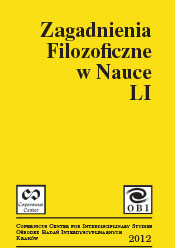Granice wyjaśnienia naukowego, część I
Limits of scientific explanation (I)
Author(s): Marcin GorazdaSubject(s): Logic, Philosophy of Science, Methodology and research technology
Published by: Copernicus Center Press
Keywords: scientific explanation; naturalism; unity of science; philosophy of economics; complexity;
Summary/Abstract: The purpose of the paper is to challenge one of the most important assumptions of the neo-positivists, namely the unity of science. The idea that all of the sciences, both natural and social, should have the same structure and should deploy similar methods is, after Grobler, called naturalism. I try to argue for anti-naturalism. An interesting example seems to be economics. It does not, however, demonstrate the success, similar to that achieved by natural sciences. Certain naturalistic explanations for this lack of success are reviewed and criticized in the paper. Firstly, complexity: at the beginning of this naturalistic argument, one encounters the problem of definition. Up to nine different notions of complexity are proposed and only a few of them are practically quantitative. Secondly, mathematics: in the natural sciences we explore mathematical theories in order to capture the regularities in the investigated phenomena and to include them in the corresponding equations. However, even if we do not have a perfectly corresponding mathematical model, regularities themselves can be observed. Wherever we do not have a good theory expressed in terms of exact mathematical equations, we should at least be able to judge the existence or non-existence of certain regularities on the basis of linear (statistical) or non-linear methods. Those methods, some of them extremely sophisticated, are being extensively applied in economics and in econometrics (the so called quantitative methods). The results are disappointing. The anti-naturalistic argumentation of Grobler is dealt with separately. Grobler names three anti-naturalistic arguments: complexity (as mentioned above), the free will of humans (which the author did not find interesting enough) and, finally, the reasoning which is called, ”inherent two-way interdependence”. Grobler maintains that we are able to work out a meta-theory which shall include both predictions and the possible impact of those predictions on the theory’s object. This proposal is rejected in the paper.
Journal: Zagadnienia Filozoficzne w Nauce
- Issue Year: 2012
- Issue No: 51
- Page Range: 41-75
- Page Count: 35
- Language: Polish

